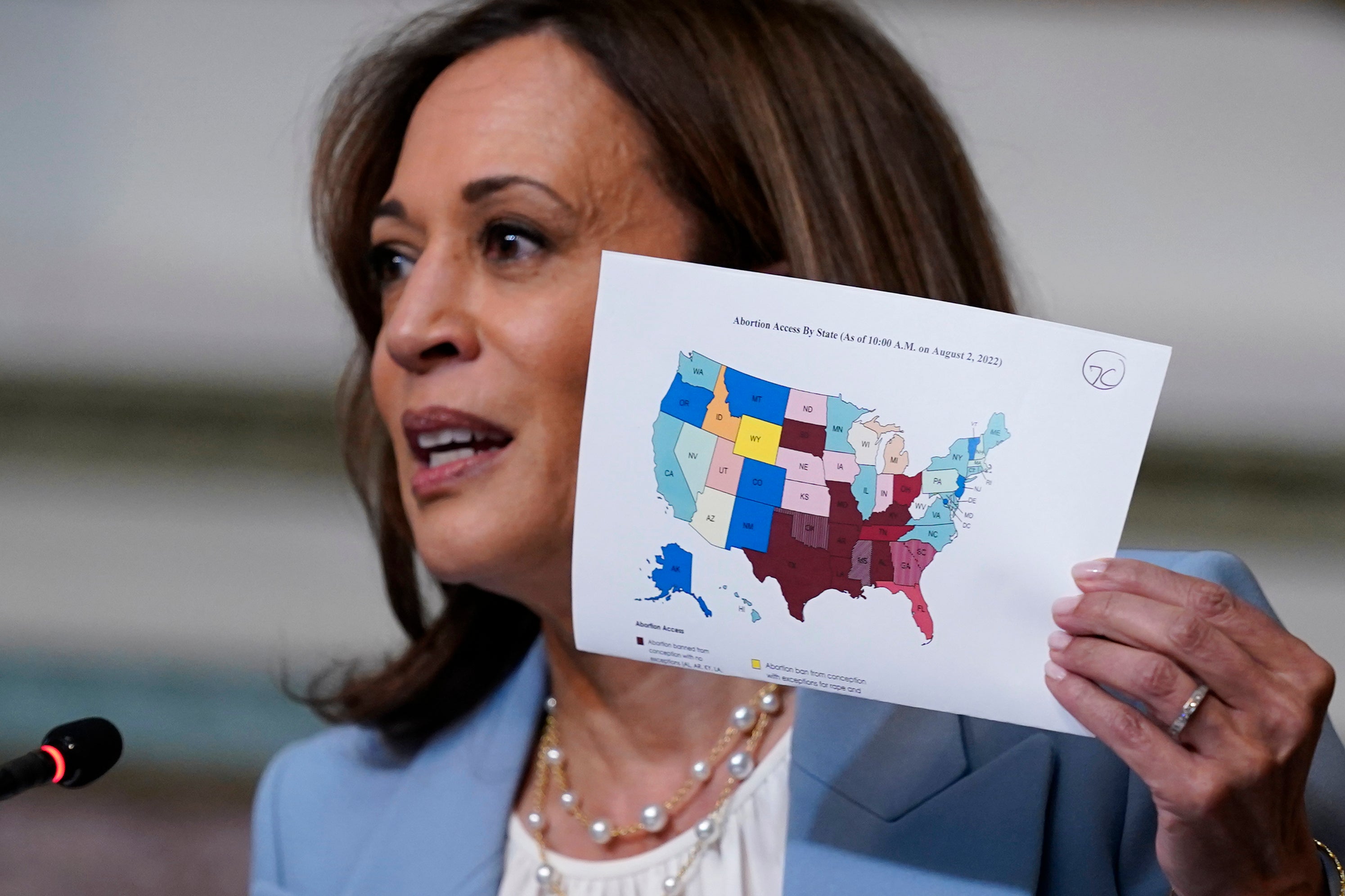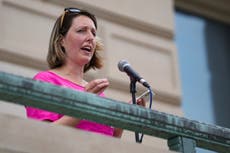The Supreme Court ‘practically dared’ Americans to show up for abortion rights. Kansas voters overwhelmingly did
America’s first post-Roe referendum on abortion rights galvanised voters. It also underscored the fragility of abortion care in the region and across the US
It was not what anti-abortion lobbyists, Republican legislators and a multi-million dollar effort to end legal abortion care expected.
A confusingly worded ballot question in Kansas, tucked into a midterm primary without any statewide Democratic elections, was supposed to cruise to victory in a “red state” that went for Donald Trump in 2020, joining the nationwide campaign to end legal abortion after the decades-long movement to gut Roe v Wade got what it wanted.
Instead, a record number of Kansas voters turned out for an election to reject a Republican-drafted amendment that would strip abortion rights from the state’s constitution, which lost by nearly 20 percentage points, and sent a resounding message showing just how deeply unpopular the Supreme Court’s decision to revoke abortion rights is, and how crucial bodily autonomy protections are.
Kansans did not have to look far to see the immediate impacts of the court’s ruling – neighbouring states Oklahoma and Missouri quickly outlawed abortion care, and patients across the US have detailed the legal chaos for their care, from being denied prescription drugs to critical delays for life-saving treatment.
Kansas abortion providers have been a lifeline for patients coming from other states – but “care looks different in a post-Roe world, and none of it has improved,” said Emily Wales, president of Planned Parenthood Great Plains.
The election “absolutely galvanised people to stand up and protect their own rights and the rights of other people in this state,” Ms Wales said during a post-election briefing with reporters on 3 August.
But it also underscored the fragility of healthcare in the region and across the US.
“We’re under no illusion that abortion will continue to be politicised in this state,” Ms Wales said. “Politicians in Kansas and throughout the region have used abortion as a wedge … so we know attacks are coming. We still think it’s very likely restrictions will be introduced, but we are here to advocate for ongoing access to care.”
“Abortion providers and abortion rights advocates hope that the opposition “will take this result for what it is: a clear and unequivocal statement from a majority of Kansans that they no longer want the government to intervene in private medical decisions,” according to a statement from Trust Women, which operates a clinic in Wichita.
“We hope anti-abortion lawmakers in the state legislature take to heart the message sent to them by their own constituents: stop meddling in matters that belong solely to Kansas families,” the group said in a statement to The Independent.
Abortion is legal in Kansas up to 20 weeks of pregnancy, though roughly half of all abortions performed in the state last year were among people who traveled from elsewhere.
Kansas – like many other states with narrow legal access to abortion – already has tight restrictions on abortion, including requirements that patients must undergo state-directed counseling and an ultrasound, a mandatory 24-hour waiting period, and bans on certain health insurance coverage and telemedicine appointments for medication abortion prescriptions.
In the weeks after the Supreme Court’s 24 June decision in Dobbs v Jackson Women’s Health Organization, Planned Parenthood facilities in Kansas have been flooded with calls. Abortion is illegal in three of the four states served by Planned Parenthood Great Plains.
“There is more need than we can provide at this time,” Ms Wales said. “We just don’t have enough providers in this part of the country.”
Out-of-state patients must also navigate transportation, childcare, time off work – all the while wondering why “if you live in Missouri and have fewer rights in Kansas,” Ms Wales said.
In the days leading up to the election, Kansas Secretary of State Scott Schwab expected a turnout of about 35 per cent of registered voters in the state. By Tuesday night, he expected that figure would likely hit 50 per cent – a double-digit increase, nearing the level of turnout from 2018 primary elections.
Among the more than 900,000 votes cast on the proposed constitutional amendment, roughly 60 per cent rejected it, based on preliminary votes released by his office.
In far-western counties like Hamilton, which Mr Trump won by 81 per cent of the vote in 2020, “yes” votes for the amendment reached only 56 per cent. In neighbouring Greeley County, which went for Mr Trump by 85 per cent in 2020, only 60 per cent supported the amendment.
The results also resonated internationally, shaking stereotypes about so-called “red state” voters shared by pundits and onlookers, revealing the nuanced political and ideological landscape among Americans and their bodily autonomy. After poll after poll showed that most Americans want to protect abortion rights and disagreed wih the Supreme Court’s decision, the vote in Kansas made that explicit.

The day after the results rolled in, President Joe Biden said that the Supreme Court had “practically dared women in this country to go to the ballot box and restore the right to choose,” while anti-abortion lawmakers vastly underestimated how Americans would respond.
He pointed to the justices’ own writing in the Dobbs decision: “Women are not without electoral or political power.”
“They don’t have a clue about the power of American women,” he said. “In Kansas, they found out women and men did exercise their electoral political power with a record turnout.”
“The people of Kansas spoke, and so this is a matter of defense of basic principles of liberty and freedom in America,” Vice President Kamala Harris added. “They spoke loudly in saying that they trust women to make decisions about their own lives and their bodies.”
Join our commenting forum
Join thought-provoking conversations, follow other Independent readers and see their replies
Comments


Bookmark popover
Removed from bookmarks